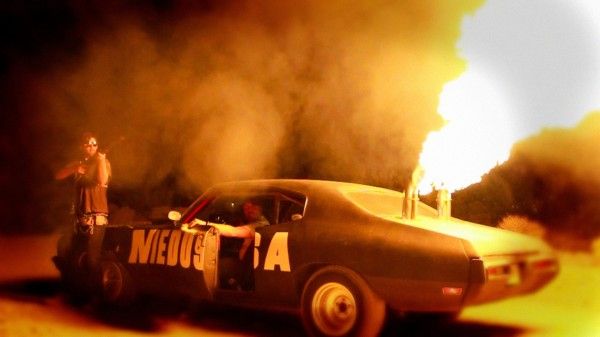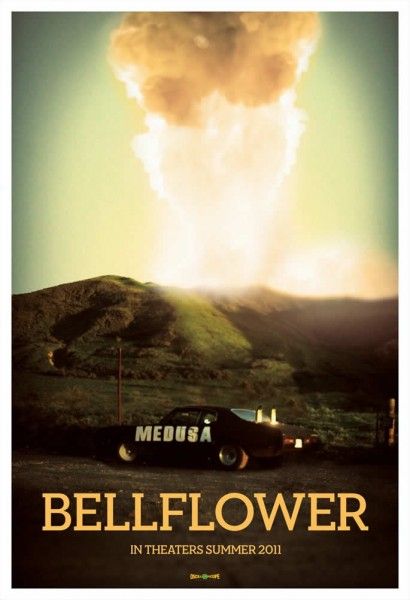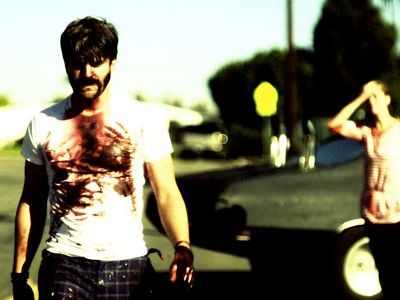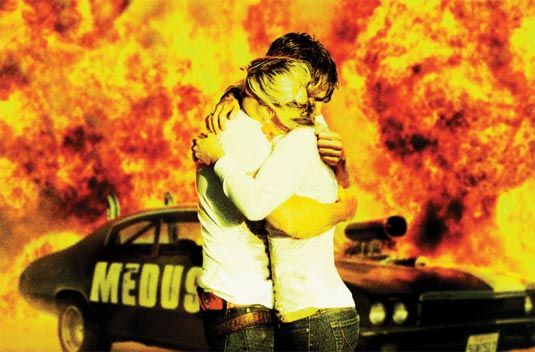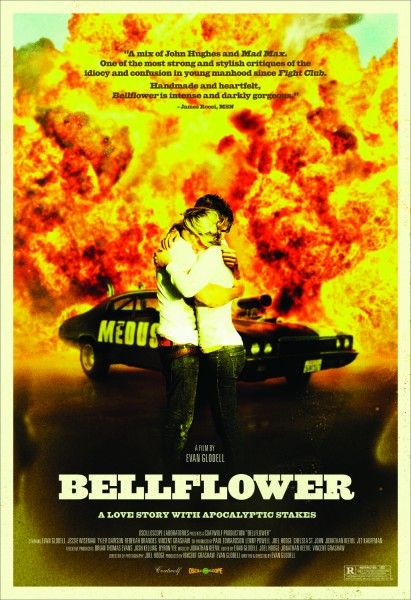Writer/director Evan Glodell's Bellflower is one of the more divisive films of the year:  judging from the conversations I've had with people since seeing the film at SXSW (all the way back in March), it appears that Glodell's film is a "love it or hate it" kinda picture.  By now, you've probably seen the film's trailers, posters, and flame-spewing car (named Medusa), and you're probably wondering what the hell Bellflower is all about.  On the one hand, I've seen the film three times now and I'm still not sure I know exactly what it's "about".  On the other hand, I took a crack at figuring it out when I spoke to Glodell earlier this week. Here's a few of the highlights:
Check out the full interview after the jump:
I've seen a lot of movies this year-- perhaps more this year than any other-- and, of those films, Bellflower is tied with Joe Cornish's Attack The Block as my pick for "Best Film of The Year".  Bellflower tells the story of Woodrow and Aidan, a pair of aimless, late-20's ruffians who get drawn into a violent, bitter series of events after Woodrow's relationship with the flamboyant Millie goes haywire.  The film features a flame-thrower, some truly disturbing violence, a small amount of post-apocalyptic imagery (which may or may not be real), and a whole lot of talk about Mad Max's Lord Humongous.
Here's how the full interview went down:
Question: Â Now, I saw the film for the first time all the way back in March, at SXSW, and I loved it. Â Was one of my favorite things that I saw at South-by this year. Â Since then, I've talked to a bunch of other people that have seen it, and each person seems to have their own, very particular way of describing what the film is. Â What's your personal take on that? Â Like, if you were asked to provide a description of the film, how would you do that?
EVAN GLODELL: Â That's so funny because I'm the worst at it...
Oh, yeah? Â How come?
GLODELL: Â Well, before I made the movie, the whole thing was kinda stuck in my head. Â And while I was writing it, people would ask me, "Well, what is it, what is it?" Â And I'd say (reluctantly), "Well, uh, it's...there's a love story...and there's violence...and it's not boring," and that was it.
Well, maybe that could be its own new genre, something you just broke ground on. Â The "It's a violent, not-boring love story" genre.
GLODELL: (Laughs)
Overall, have you been happy with the reaction people have had to the film? Â You must be, right?
GLODELL:  Oh, unbelievably happy.  I keep hearing that there's mixed reaction, but I haven't seen any of that.  Maybe the people that just didn't like the  movie aren't talking about it as much, or they don't talk to me because they didn't like it....but almost everything I've heard or read has been positive.  I think I've heard of two or three reviews where people were bashing on it, and it was obviously that they, like, passionately hated it, but you're always going to get that (with something like this).
It's definitely kind of an "acquired taste" sorta movie. Â It's really dark, it crosses genres-- you're not going to have a universally sunny attitude shot back at it because of that, I think. Â Even the people I've talked to that flat-out disliked it have also said that they think it's well made. Â It seems like more of a "It's not my cuppa tea" kind of a reaction.
GLODELL: Â Well, yeah, I've seen a couple of those (laughs).
As I understand it, you wrote the script when you were much younger, and then rewrote it several years later when you were actually going to go through with making it. Â How different was that original draft from what we're seeing in the final version?
GLODELL: Â Y'know, it's odd. Â It's very different and it's also...almost the exact same movie. Â There's...a lot less there, I feel like.
Can you give me an example?
GLODELL: Â If you took out a lot of the elements of their Medusa gang and just had their relationship...well, a while ago I took out the first draft of the script and reread it, and it was like, "This is crazy! Â It's like the exact same movie from a different dimension!" Â It was oversimplified and just a lot more focused on...like the Medusa car-- the original script had the flame-thrower only. Â And that may sound like a little thing, but the Medusa car really changes the focus of the second half of the movie.
And it's become pretty iconic in the marketing of the movie.
GLODELL: Â Oh, yeah.
Where is the car now? Â The last time I saw it, you were demoing it at the Drafthouse downtown.
GLODELL: Â We drove it all over the place! Â Since SXSW, there's been 12,000 miles put on it. Â We took it around to all the festivals we played...and for me, well, I don't have another car. Â That's my car.
That's your standard ride?!
GLODELL:Â Yeah, it's parked out front of my house right now. Â I go to the store in it...
That's funny as shit. Â I think that I might've been more impressed with the whiskey dispenser (ed. note: Â another car featured in Bellflower-- named "Speed Biscuit"-- has a whiskey-dispenser in the dashboard) than I was with the flame-thrower.
GLODELL:Â They're completely different aesthetics. Â Some people are all about the Medusa car, and some people are like, "No, Speed Biscuit-- with the dispenser-- is the way better car".
I understand the script is really personal to you and the result of you going through a particularly tough breakup. Â What's it like turning that pain into a movie and screening it for other people as entertainment? Â Is that as odd as it would seem to be?
GLODELL: Â It's definitely odd! Â It's one of those things that's odd in concept more than anything. Â Sometimes I'll think about it and be like, "That is really weird." Â Like, I notice it a lot at screenings. Â Generally, I don't sit and watch the movie while it's playing-- I'll go to a bar next door, or a restaurant, or wherever-- but one time I sat and watched the film, and afterwards-- during the Q&A-- I was, like, really depressed. Â Normally, I've gone somewhere else for a few hours and I'll come back for the Q&A in a great mood, like (chipper voice) "Hey, everybody! Â How are ya? Â Did you like the movie?!" Â And the audience is generally the opposite (mood-wise), because they've just watched this really dark, depressing movie.
I understand you basically got to a point with the film where you were like, "OK, we're going out and shooting this thing whether we have the money to do it or not". Â Do you have a final, ballpark figure on how much it cost to make?
GLODELL: Â Between all eleven of us, over the course of three years...it's around $17,000.
No shit!
GLODELL: Â Yeah.
That's impressive.
GLODELL: Â Well, yeah...it was difficult.
Besides the lack of funding, what were some of the bigger obstacles you had making the film? Â Were there things you just didn't foresee that caused you a lot of problems when the actual shooting was taking place?
GLODELL: Â Um...I'm trying to think of something interesting....I haven't been asked that question before...
How about locations?
GLODELL: Â Locations were absolutely one of the hardest things. Â In the beginning, I was like, "Alright, if we're gonna throw our lives away on this, put ourselves into debt, quit our jobs and sell our belongings-- we better do a good job. Â We can't compromise on very much." Â So, we decided to ask around to all the people we knew to see if they had apartments or houses that we could use for the characters, and everything we came up with just didn't feel right. Â They weren't interesting, or they didn't fit the characters...it was a big challenge. Â That was definitely an ongoing battle. Â And we also knew we had to get out to the desert at some point, and we didn't end up doing all those sequences-- the ones at the end of the film-- until two years after we'd filmed everything else. Â It had to wait until we got the money to drive four vehicles and a bunch of people out into the desert.
Wow, so you were shooting chunks of it whenever you could, and large blocks of time might pass between each round of shooting?
GLODELL: Â Well, not really. Â Well, yes and no. Â Kinda. Â We shot for 90 days straight in the summer of 2008, and that was most of the movie. Â Most of the stuff we couldn't get was the really cool digital stuff, so we ended up shooting every single dialogue scene, and then we came back for the other stuff. Â Maybe 95% of the stuff was shot first. Â And then, over the next two and a half years of editing, whenever I could get money to get another shot, I'd go do that. Â And every two or three weeks we'd have shooting for another day or two.
What other films or directors influenced you on this project?  I know you mentioned that Hearts of Darkness-- the documentary about the making of Apocalypse Now-- helped you get through the editing phase.
GLODELL: Â I think I said that in my first interview! Â But I don't like to answer this question. Â I'm not going to say that I wasn't influenced by anyone else, because the way my mind works is, I'm completely influenced by everything I've seen done before. Â But I've never been able to make sense of it, narrow it down...
Gotcha.
GLODELL: Â And the Hearts of Darkness thing, that was kind of an inspirational thing, because at that time we were kinda dragging and it was at a point where there was no, like, light at the end of the tunnel. Â People started falling off (the project), and I was like, "Fuck, we really gotta finish this thing somehow, how am I gonna do it?" Â I knew I'd get it there no matter what it took, but when I saw that documentary, I realized that we were just going through a micro version of what those people went through.
Were there moments during editing or filming where you thought, "This movie's too dark, it's too weird, people aren't gonna get it"...or did you feel that you didn't care, that you just wanted to tell the story and whatever happens, happens?
GLODELL: Â No, no, no. Â That was a very real thing. Â But only in moments. Â I could sometimes go weeks and never have that thought, and then I'd suddenly wake up in the middle of the night and be like, "Man, this thing is way too personal". Â Especially during the later moments, where it gets a little more abstract and symbolic. Â (I thought) "If people didn't get it, they're going to hate my guts and think I'm a bad person". Â I would have moments of panic where I really wanted to destroy the movie. Â But...y'know, it worked out.
Without spoiling anything, I just want to tell you that I thought the "Tattoo Scene" was so disturbing, and I've found myself thinking a lot about that scene ever since I watched the film. Â I've talked to other people about it, too, and I can't seem to get to the root of why I found that sequence so utterly disturbing. Â I can't figure it out. Â But I had a visceral reaction to that, and I'm wondering if you can talk a little about that scene: Â the genesis of it, or where the idea came from, or....anything, really.
GLODELL: Â Very interesting! Â No one has asked me that, either! Â There's gotta be a couple different answers to that, and I'm sure that they'd all be equally valid...but the thing is, I almost don't wanna say it? Â I was not quite aware of how disturbing that would be to other people. Â I guess it would be fair to say I've been pleasantly surprised by that, really. Â But...what does it mean?
Uh, well...sure. Â We'll take it from that angle.
GLODELL: Â That's funny, because that's the angle I don't think I can answer it from. Â It's one of those things where we could put words on it and have an explanation for it, but that's why we make movies: Â the words wouldn't have worked. Â But at the same time, I don't wanna cop out of the question...I'm not trying to say, like (dramatic voice) "It's beyond words!" or anything like that, I just don't know if I could (do it justice).
(Laughs) Â OK, well let's try this: Â why do you think that people have reacted so strongly to it?
GLODELL: Â Well, that I have a couple answers for. Â For one thing, it's just a really horrible, disturbing thing. Â I mean, most people have nightmares about their teeth falling out or whatever, right? Â Well, it's kind of like that: Â you can't grow new teeth. Â You're disfigured for life. Â So, it's kinda like that. Â I have nightmares where my arms are missing, and...well...
I kinda figured that it was symbolic of the scarring that (one character) had left on (another) after the breakup, like the literal version of that emotional scarring. Â Like, (one character) had left (his/her) mark on (the other character).
GLODELL: Â Yeah! Â And there is a valid answer for one thing you asked, and that's where the idea came from: Â I think that's the only idea that came to me in a dream. Â All ideas are kinda magical, right? Â You don't just pull 'em out of the air and make 'em happen. Â But that idea came to me in a dream, and that had never happened to me. Â But I remember waking up from the dream and screaming--
Yeah...
GLODELL: -- because I was so excited! Â Like, "Yes! Â That's perfect!" Â And it was actually an idea I used for a short film that I made a few years ago, which was entirely about that premise, where someone was being tattooed like that.
Huh. Â I'd be interested to see that short. Â Is there any way to see that, or is that just something that's gonna stay sitting around your house?
GLODELL: Â It's sitting around my house. Â The weird thing is, there's a couple of short films I made before I wrote the script, and they're obviously just me testing things before I made the movie.
Is there any chance you'd put some of 'em on the DVD or Blu-ray when Bellflower comes out?
GLODELL: Â Eh, I don't think I'd be able to put 'em on there, but I'd definitely like to make them available eventually. Â They're really crude and weird and...I dunno, kind of embarrassing to show to people, but...
Well, they might be, but I think people would be interested to see 'em. Â Well, I would be, anyway. Â I've got a few more questions for you, and then we're done here, I think. Â I wanted to ask about your decision to build your own cameras. Â I'm not a technical guy and don't really ever get into the nitty-gritty of cameras and lenses and all that shit, but I'm wondering why you felt like you needed to create your own cameras for the film.
GLODELL: Â That's interesting, too. Â It started when I was first making short films. Â I was making these things and trying to figure out how to make my crappy camcorder look better. Â And, after I figured that out, I had an idea of how cameras work, how optics work, and all of a sudden I was like, "Wait, there's a lot more that could be done with this," so I started building more elaborate rigs to work with. Â And I just think that's...y'know, something that I do. Â If I have an idea I want to put in a movie, I know what camera will make that look best, and I have ideas for future projects and stuff I'd like to build for those. Â I think it's just part of how I work, though.
It makes sense given your background. Â You were going to be an engineer, right?
GLODELL: Â Yeah! Â But I went out to school, I was there for, like, a week, and I just decided I wasn't going to do that. Â And I left.
The film comes out August 5th. Â Is there any chance it'll be available OnDemand at the same, for those that aren't living where it's been released theatrically?
GLODELL: Â I don't know, but I don't think so because I haven't heard anything about that.
Gotcha. Â And, finally: Â what are you working on now? Â Another script?
GLODELL:  Yes!  I have a script with one draft finished, and as soon as things slow down on all the Bellflower stuff, I'm gonna focus on that.
Can you tell me anything about it?
GLODELL:  Well, it's the same thing where, it's really hard to describe-- but, obviously, it's not the same as Bellflower.  I don't even have a name for it yet.
Can you gimme a logline, or a plot?
GLODELL: Â I....can't (laughs).
No, it's cool. Â Next time I talk to you, it'll be about that.
GLODELL: Â Yes!
Bellflower opens in theaters tomorrow (check your local listings), and you should absolutely see it. Â Special thanks to Evan Glodell for answering these questions as best he could.

